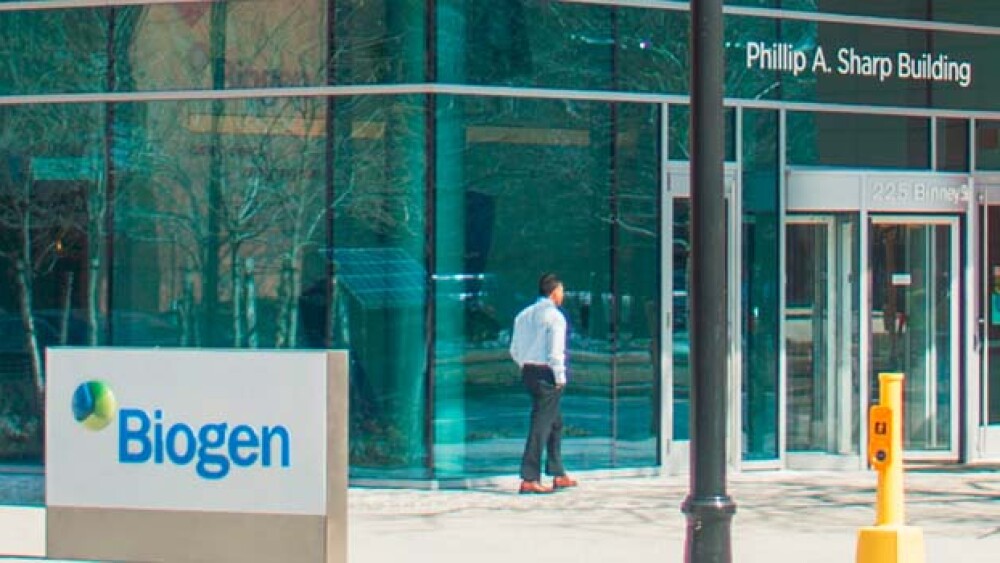Biogen and Alkermes announced positive topline data from EVOLVE-MS-2, a Phase III trial of diroximel fumarate for relapsing-remitting multiple sclerosis compared to Tecfidera.
Biogen, headquartered in Cambridge, Massachusetts, and Alkermes, based in Dublin, announced positive topline data from EVOLVE-MS-2, a Phase III trial of diroximel fumarate for relapsing-remitting multiple sclerosis (RRMS) compared to Tecfidera (dimethyl fumarate).
Biogen and Alkermes inked a global license and collaboration deal in 2017 to develop and commercialize ALKS 8700 for relapsing forms of multiple sclerosis (MS).
ALKS 8700, diroximel fumarate, is a novel, oral, monomethyl fumarate (MMF) small molecule. Under the deal, Biogen received exclusive, worldwide license to commercialize ALKS 8700. Biogen will pay Alkermes mid-teen royalties on worldwide net sales. Biogen also paid Alkermes 50% of the 2017 ALKS 8700 development costs, and an upfront payment of $28 million, which represented Biogen’s share of development expenses incurred in 2017.
Starting Jan 1., 2018, Biogen took over the development expenses, with Alkermes eligible for a maximum aggregate of $200 million in milestones.
In the trial, diroximel fumarate was statistically superior to Tecfidera and patients receiving diroximel fumarate reported significantly fewer days of gastrointestinal symptoms. The most common adverse events for both treatment groups were flushing, diarrhea and nausea. Overall percentage of patients with AEs causing discontinuation were 1.6% for diroximel fumarate and 6% for Tecfidera.
“As part of our leadership in multiple sclerosis, Biogen has long understood that the disease differs from person to person, as well as throughout the course of the disease,” stated Michael Ehlers, executive vice president, Research & Development, at Biogen. “We are committed to offering a range of options to patients to meet their needs. These data build on the foundation we have created with Tecfidera, the most prescribed oral MS therapy worldwide, and further demonstrate the potential of diroximel fumarate as a novel oral fumarate within our MS portfolio.”
The EVOLVE-MS-2 Phase III trial ran for five weeks and was designed to evaluate the GI tolerability of diroximel fumarate 462 mg twice a day compared to Tecfidera 240 mg twice daily in 506 patients with RRMS.
EVOLVE-MS-2 is part of the EVOLVE-MS diroximel fumarate development program, which is being run by both Alkermes and Biogen. Diroximel fumarate is currently being reviewed by the U.S. Food and Drug Administration (FDA) with a target action date in the fourth quarter of this year. Biogen plans to market the drug under the name Vumerity.
“With a chronic disease like MS, interrupting or stopping treatment due to GI side effects can often provoke the return of disease activity,” stated Robert Naismith, professor of neurology, Washington University School of Medicine in St. Louis. “Physicians and patients should work together to choose a medication that provides the right balance of efficacy, safety and tolerability to help manage patients’ MS and meet their treatment goals. These topline results suggest that diroximel fumarate offers a differentiated GI tolerability profile and may represent an important new option for people living with relapsing MS.”
The EVOLVE-MS program includes the EVOLVE-MS-1 trial, a Phase III, open-label, two-year safety trial, and EVOLVE-MS-2, a Phase III, five-week trial to evaluate GI tolerability.





